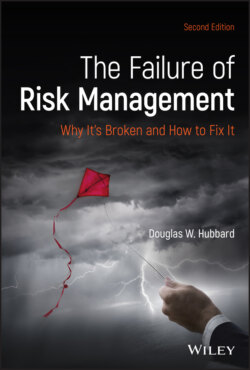Читать книгу The Failure of Risk Management - Douglas W. Hubbard - Страница 28
На сайте Литреса книга снята с продажи.
Expert Intuition, Checklists, and Audits
ОглавлениеThe most basic of these is part of the “everything else” category in exhibit 2.2—expert intuition. This is a sort of baseline of risk management methods. This is pure gut feel unencumbered by structured rating or evaluation systems of any kind. There are no points, probabilities, scales, or even standardized categories. There are shortcomings to this but there is also lot of value. Experts do know something, especially if we can adjust for various biases and common errors. In order for other methods to be of any value at all, they must show a measurable improvement on gut feel. (In fact, we will show later that unaided expert intuition isn't the worst of them.)
Other approaches that we lumped into the “everything else” category are various forms of audits and checklists. They don't do any structured prioritization of risks based on real measurements. They just make sure you don't forget something important and systematically search for problems. You definitely want your pilot and surgeon to use checklists and to guard against fraud or mistakes; you want your firm's books to be audited. I mention them here because it could be argued that checklists sometimes perform a pure assessment role in risk management. Most organizations will use audits and checklists of some sort even if they don't fall under the sort of issues risk managers may concern themselves with.
